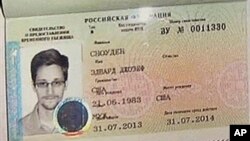People who know about these things predict accused NSA leaker Edward Snowden will soon be very unhappy he chose Russia as the place to avoid prosecution in the United States on espionage charges.
Snowden was working as a computer network manager for the National Security Agency in Hawaii, but turned up in Hong Kong earlier this summer and began releasing information about secret electronic surveillance programs the agency uses to monitor telephone and internet traffic around the world.
Then when the United States started seeking his arrest and extradition, Snowden took a plane to Moscow, where he holed up in an airport international transit zone hotel while he tried to find a more permanent place to settle outside America’s reach.
There was talk of Cuba or Venezuela, but those didn’t work out. After a month, Moscow granted him asylum for 12 months despite fierce objections from Washington.
David Barrett, a national security expert teaching at Villanova University, says Snowden will soon find out, if he hasn’t already, that Russia may not be the ideal place for a self-proclaimed whistle-blower.
“One of the things that [Russian President Vladimir] Putin said when he spoke of the possibility of Snowden’s staying there, is that Snowden would have to be quiet,” Barrett said. “He would have to stop saying things and revealing things about U.S. intelligence.
“And I don’t think that that would be a very happy existence for Snowden if he had to live under those conditions where he could not speak to reporters and groups about NSA,” Barrett added.
'Gray unhappiness'
Peter Savodnik, an expert on Americans seeking asylum in Russia, says the Moscow authorities are good at creating what he calls “a sort of gray unhappiness.”
“The Russians specialize in that sort of thing where somebody shows up at your doorstep and there is something very pathetic about this. You have nowhere else to go - you are throwing all of your trust, your faith into the Kremlin,” said Savodnik, whose upcoming book is about Lee Harvey Oswald’s brief defection to the Soviet Union.
The Kremlin, Savodnik says, will “allow you to think for a while that you have arrived. And then, of course, you realize you have not.
“And then you begin to become a little bit crazy and mad, which is what happened to Oswald and what has happened to every single American who has defected or sought asylum in Russia…, Savodnik continued.
Oswald, you may remember, came back to the United States and in 1963 was arrested on charges of assassinating President John F. Kennedy, but was himself assassinated before he could go to trial.
“I don’t think there has been a single case of an American who went to Russia since World War II and found the ‘happily ever after’ that he was looking for,” Savodnik said
As for Snowden, Savodnik says the Russians would want him far away as possible from the news media – and in the worst case scenario, they would send him to live in a remote region of the country.
Cleaning gymnasium floors?
“They will stick him in some Khruschevka [apartment buildings built in the 1960s] or some other Brezhnev-era dump,” he predicted. “He’ll clean the floors of some gymnasium or work in some broken down factory that is being propped up by the state and probably shouldn’t exist.”
Wherever Snowden ends up, says Matthew Rojansky, director of the Kennan Institute at Washington’s Wilson Center, one thing is certain: no-one is going to trust Edward Snowden.
“Because it’s understood: this is someone who would betray their own country and so that’s hard to respect for most ordinary people, including Russians,” Rojansky said.
“That has been the fate of almost every westerner who has spied or defected and then gone to the Russians – they end up being quite isolated, and perhaps living comfortably if they stay for the long term, but certainly not living well in the sense of being fully integrated in a part of their society.”
And Rojansky says the Snowden affair will inevitably affect relations between Washington and Moscow.
“The Snowden issue is going to remain on those lists that senior American officials take into negotiations for years to come,” he said. “It may not be at the top of the list, but it will be somewhere on there.
“And at some point, America will be able to offer enough to Russia and the circumstances will be right, and the media spotlight will have faded, and so maybe they’ll move him on to a third country,” Rojansky said. “He’ll spend some decent interval of time there and then suddenly he’ll end up in a courtroom in Honolulu or something like that.”
Analysts say there is no doubt Snowden would have a better life in a place other than Russia, but where that would be is anybody’s guess.
(Too see more of Andre de Nesnera's columns, click on the link below)
Snowden was working as a computer network manager for the National Security Agency in Hawaii, but turned up in Hong Kong earlier this summer and began releasing information about secret electronic surveillance programs the agency uses to monitor telephone and internet traffic around the world.
Then when the United States started seeking his arrest and extradition, Snowden took a plane to Moscow, where he holed up in an airport international transit zone hotel while he tried to find a more permanent place to settle outside America’s reach.
There was talk of Cuba or Venezuela, but those didn’t work out. After a month, Moscow granted him asylum for 12 months despite fierce objections from Washington.
David Barrett, a national security expert teaching at Villanova University, says Snowden will soon find out, if he hasn’t already, that Russia may not be the ideal place for a self-proclaimed whistle-blower.
“One of the things that [Russian President Vladimir] Putin said when he spoke of the possibility of Snowden’s staying there, is that Snowden would have to be quiet,” Barrett said. “He would have to stop saying things and revealing things about U.S. intelligence.
“And I don’t think that that would be a very happy existence for Snowden if he had to live under those conditions where he could not speak to reporters and groups about NSA,” Barrett added.
'Gray unhappiness'
Peter Savodnik, an expert on Americans seeking asylum in Russia, says the Moscow authorities are good at creating what he calls “a sort of gray unhappiness.”
“The Russians specialize in that sort of thing where somebody shows up at your doorstep and there is something very pathetic about this. You have nowhere else to go - you are throwing all of your trust, your faith into the Kremlin,” said Savodnik, whose upcoming book is about Lee Harvey Oswald’s brief defection to the Soviet Union.
The Kremlin, Savodnik says, will “allow you to think for a while that you have arrived. And then, of course, you realize you have not.
“And then you begin to become a little bit crazy and mad, which is what happened to Oswald and what has happened to every single American who has defected or sought asylum in Russia…, Savodnik continued.
Oswald, you may remember, came back to the United States and in 1963 was arrested on charges of assassinating President John F. Kennedy, but was himself assassinated before he could go to trial.
“I don’t think there has been a single case of an American who went to Russia since World War II and found the ‘happily ever after’ that he was looking for,” Savodnik said
As for Snowden, Savodnik says the Russians would want him far away as possible from the news media – and in the worst case scenario, they would send him to live in a remote region of the country.
Cleaning gymnasium floors?
“They will stick him in some Khruschevka [apartment buildings built in the 1960s] or some other Brezhnev-era dump,” he predicted. “He’ll clean the floors of some gymnasium or work in some broken down factory that is being propped up by the state and probably shouldn’t exist.”
Wherever Snowden ends up, says Matthew Rojansky, director of the Kennan Institute at Washington’s Wilson Center, one thing is certain: no-one is going to trust Edward Snowden.
“Because it’s understood: this is someone who would betray their own country and so that’s hard to respect for most ordinary people, including Russians,” Rojansky said.
“That has been the fate of almost every westerner who has spied or defected and then gone to the Russians – they end up being quite isolated, and perhaps living comfortably if they stay for the long term, but certainly not living well in the sense of being fully integrated in a part of their society.”
And Rojansky says the Snowden affair will inevitably affect relations between Washington and Moscow.
“The Snowden issue is going to remain on those lists that senior American officials take into negotiations for years to come,” he said. “It may not be at the top of the list, but it will be somewhere on there.
“And at some point, America will be able to offer enough to Russia and the circumstances will be right, and the media spotlight will have faded, and so maybe they’ll move him on to a third country,” Rojansky said. “He’ll spend some decent interval of time there and then suddenly he’ll end up in a courtroom in Honolulu or something like that.”
Analysts say there is no doubt Snowden would have a better life in a place other than Russia, but where that would be is anybody’s guess.
(Too see more of Andre de Nesnera's columns, click on the link below)






